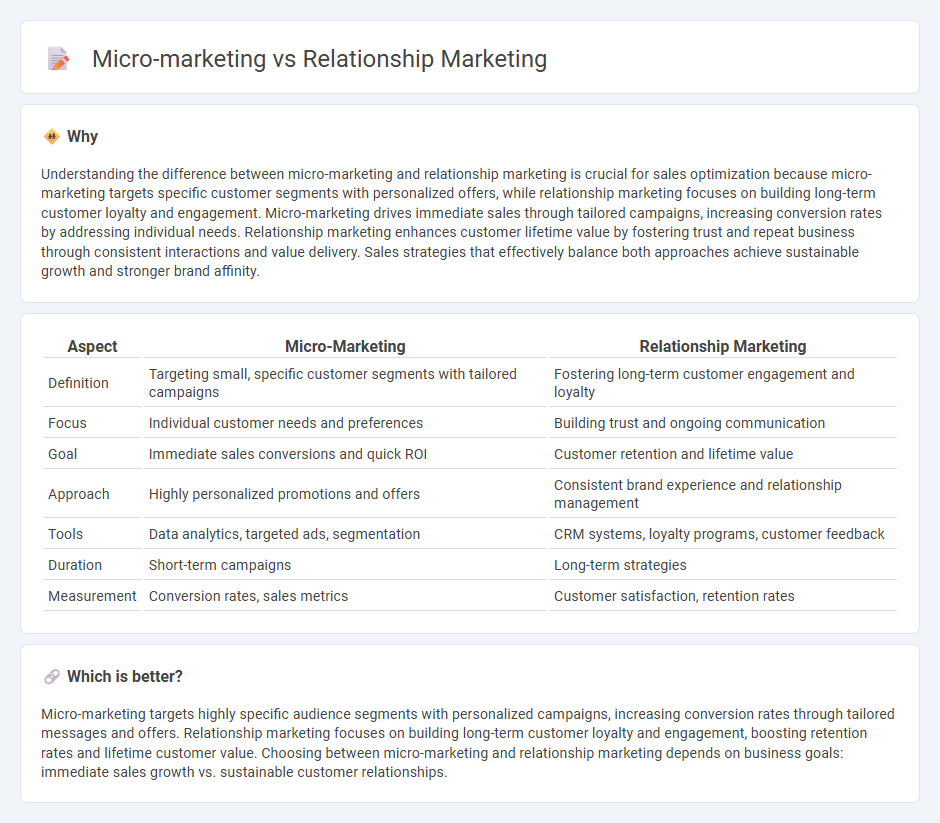
Micro-marketing focuses on targeting specific customer segments with personalized campaigns to maximize immediate sales impact, while relationship marketing aims to build long-term customer loyalty through ongoing engagement and trust. Both strategies leverage data analytics and customer insights but differ in their approach to customer interaction and retention. Explore deeper into how these marketing tactics can transform your sales strategy effectively.
Why it is important
Understanding the difference between micro-marketing and relationship marketing is crucial for sales optimization because micro-marketing targets specific customer segments with personalized offers, while relationship marketing focuses on building long-term customer loyalty and engagement. Micro-marketing drives immediate sales through tailored campaigns, increasing conversion rates by addressing individual needs. Relationship marketing enhances customer lifetime value by fostering trust and repeat business through consistent interactions and value delivery. Sales strategies that effectively balance both approaches achieve sustainable growth and stronger brand affinity.
Comparison Table
| Aspect | Micro-Marketing | Relationship Marketing |
|---|---|---|
| Definition | Targeting small, specific customer segments with tailored campaigns | Fostering long-term customer engagement and loyalty |
| Focus | Individual customer needs and preferences | Building trust and ongoing communication |
| Goal | Immediate sales conversions and quick ROI | Customer retention and lifetime value |
| Approach | Highly personalized promotions and offers | Consistent brand experience and relationship management |
| Tools | Data analytics, targeted ads, segmentation | CRM systems, loyalty programs, customer feedback |
| Duration | Short-term campaigns | Long-term strategies |
| Measurement | Conversion rates, sales metrics | Customer satisfaction, retention rates |
Which is better?
Micro-marketing targets highly specific audience segments with personalized campaigns, increasing conversion rates through tailored messages and offers. Relationship marketing focuses on building long-term customer loyalty and engagement, boosting retention rates and lifetime customer value. Choosing between micro-marketing and relationship marketing depends on business goals: immediate sales growth vs. sustainable customer relationships.
Connection
Micro-marketing targets specific customer segments with personalized strategies that enhance relationship marketing by fostering trust and long-term loyalty. Relationship marketing builds strong customer connections through tailored communication and personalized experiences, which micro-marketing enables by delivering relevant offers to niche audiences. Together, they drive higher customer retention, satisfaction, and increased lifetime value by aligning marketing efforts with individual needs.
Key Terms
**Relationship Marketing:**
Relationship marketing centers on building long-term customer engagement through personalized communication, trust development, and consistent value delivery. Key strategies include loyalty programs, customer feedback integration, and targeted content that fosters emotional connections and repeat business. Discover how relationship marketing can transform customer retention and brand loyalty by exploring its core principles in detail.
Customer Retention
Relationship marketing emphasizes long-term customer retention through personalized engagement and consistent value delivery, fostering loyalty and trust over time. Micro-marketing targets narrowly defined audience segments with tailored messages, increasing relevance and customer satisfaction within specific niches. Explore how these strategies can enhance your customer retention efforts for sustained business growth.
Trust Building
Relationship marketing centers on trust building through long-term customer engagement and personalized communications, fostering loyalty and repeat business. Micro-marketing targets niche segments with highly tailored messages and products, creating trust by addressing specific needs and preferences within smaller audiences. Explore how both strategies effectively cultivate trust to enhance customer retention and brand reputation.
Source and External Links
What Is Relationship Marketing? | Definition from TechTarget - Relationship marketing focuses on building customer loyalty and long-term engagement by creating strong emotional connections, contrasting traditional transactional marketing by emphasizing retention over individual sales.
Relationship Marketing: The Ultimate Guide - Relationship marketing is a strategy to foster customer retention, satisfaction, and lifetime value through personalized communication, customer service, loyalty programs, and emotional connection.
Relationship Marketing: 5 Ways to Create Lifelong ... - Key ways to excel in relationship marketing include creating emotional connections, listening to customer feedback, leveraging brand communities, and offering exclusive benefits, which together drive loyalty and higher customer spending.
 dowidth.com
dowidth.com